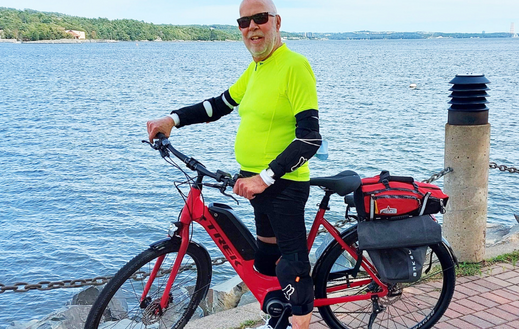A Nova Scotia senior has made it his mission to draw attention to critical gaps in the health-care system following a life-saving procedure two years ago.

John Dennis was originally told he wouldn’t be eligible for a lung transplant due to his age.
“I just kept fighting and fighting and fighting,” said Dennis, now 76, from his home in Halifax. “You have to self-advocate.”
The procedure was necessary, due to his disease: idiopathic pulmonary fibrosis (IPF), a progressive disease, in which scar tissue builds up in the lungs. It wasn’t until his brother passed away from pulmonary fibrosis in 2016 that Dennis was officially diagnosed.
“I immediately went to my family doctor and said I need to see a respirologist, I have pulmonary fibrosis,” said Dennis.
Sure enough, after some tests, Dennis was diagnosed with IPF, though doctors said he likely had the disease since 2009.
“So I was very fortunate it was slow moving, because typically — at the time — they were telling people two to five years,” he said.
Dennis ended up receiving the lung transplant in 2020 in Toronto.
Pulmonary fibrosis makes breathing difficult and painful. It can be hard to diagnose, as symptoms are relatively vague: shortness of breath, coughing and widening and rounding of the fingers and toes, also known as clubbing.
There are some anti-fibrotic drugs that interfere with the body’s ability to generate new scar tissue, which can help slow the progression of the disease, but there is no cure, and most IPF patients will eventually end up on a transplant list.
“Breathing is not a problem now,” said Dennis. “I mean, my ribs, my chest, were so sore prior to the transplant.”

Get weekly health news
Calls for universal access to oxygen
While oxygen won’t cure the disease, it will help ease the discomfort. However, access to oxygen is not equal across Canada.
“That’s been particularly a big problem in the eastern part of the country where the criteria for oxygen access are much more restrictive than in provinces like Ontario,” said Dr. Shane Shapera, the director of the interstitial lung disease and pulmonary fibrosis clinic at the Toronto General Hospital. He treats the majority of IPF patients from Atlantic Canada.
He said the criteria that some provinces, like Nova Scotia, use to decide who gets oxygen was not developed for this relatively uncommon disease.
“They were developed for diseases like emphysema or COPD, and the way that people have low oxygen levels with those conditions is different than in IPF,” Shapera said.
“It’s really hard as a medical specialist to see my patients who clearly need something and they can’t get access to it.”
Global News reached out to the Department of Health for an interview, but they declined.
Dennis said he also had trouble accessing oxygen, as his levels weren’t staying low enough for long enough — “a terrible situation,” he said.

“We just don’t think that’s right. It should be a universal right for anyone that needs access to oxygen,” said Sharon Lee, the executive director of the Canadian Pulmonary Fibrosis Foundation (CPFF).
Equal access to oxygen is something the CPFF is currently working toward. It’s undergoing a survey amongst respirologists, patients and oxygen providers to see how the current systems are working.
“And we’re going to take that survey and we’re going to create a white paper to say, ‘Here’s where we think the national standard should be. It should not matter where you reside in Canada, you will have the same standard of care,'” said Lee.
New lease on life
Dennis’ new lung has helped him do so much more than breathe easier. He’s raised more than $25,000 for research, he’s pushed Nova Scotia to cover drugs that slow the progression of the disease and he’s been part of the national drive to legislate a deemed-consent model for organ donation.
“And when I was on P.E.I. this summer, the health minister told me, ‘John, your efforts are paying off. We formed a committee between New Brunswick, P.E.I. and Newfoundland and we hope to match Nova Scotia and have the implied consent legislation by the end of the fall,'” said Dennis.
“And I’m just ecstatic about that.”

September marks Pulmonary Fibrosis Awareness Month.
“We just aren’t getting the exposure that we need. That’s my biggest concern,” he said.
“This is a terrible terminal disease and there’s not enough known about it. You ask the average person, do you know what pulmonary fibrosis is? And they have no clue.”









Comments
Want to discuss? Please read our Commenting Policy first.